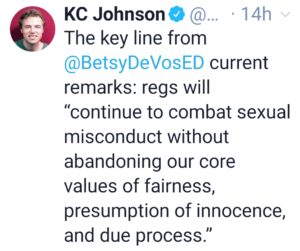STUDENTS Accused Of Sexual Misconduct Get Stronger Protections Under New Federal Rules
 Students accused of sexual misconduct will get stronger due process protections under sweeping federal rules announced by Education Secretary Betsy DeVos. The long-awaited rules make key changes to former guidelines from the Obama administration, including a tighter definition of sexual misconduct, reduced responsibility of colleges to investigate complaints and the right for advisors on all sides to cross-examine those involved.
Students accused of sexual misconduct will get stronger due process protections under sweeping federal rules announced by Education Secretary Betsy DeVos. The long-awaited rules make key changes to former guidelines from the Obama administration, including a tighter definition of sexual misconduct, reduced responsibility of colleges to investigate complaints and the right for advisors on all sides to cross-examine those involved.
DeVos has said the revisions are aimed at restoring fairness and rebalancing the rights of the accuser and accused in the contentious arena of campus sexual assault. “Today we release a final rule that recognizes we can continue to combat sexual misconduct without abandoning our core values of fairness, presumption of innocence and due process,” DeVos said during a news briefing. She said the Obama-era rules amounted to a “failed approach” that resulted in “kangaroo courts” against accused students.
When the Obama administration cracked down on college sexual assault with tougher rules, more investigations and heavier sanctions against colleges deemed lax on the issue, hundreds of alleged offenders across the nation fought back with lawsuits saying their due process rights were violated in a rush to unfair judgments. In California, some of those lawsuits have succeeded in forcing public and private campuses to strengthen due process rights for accused students. In one case last year, a state appellate court ruled that “fundamental fairness” required that accused students have a right to a hearing and to cross-examine their accusers. As a result, the University of California, California State University, USC, Occidental College and other campuses have made changes to their Title IX processes.
Mark Hathaway, a Los Angeles attorney who has represented more than 200 accused students, said he has continued to file lawsuits against California campuses alleging they have not fully complied with court directives for meaningful cross-examination and other due process protections. He said the new federal regulations would provide more specific instructions and additional pressure on campuses to conduct equitable Title IX proceedings.
“It’s been a long time coming for these protections to become federal regulations,” Hathaway said. “Colleges and universities will have to take a road that will be fair.”
latimes.com– Teresa Watanabe

